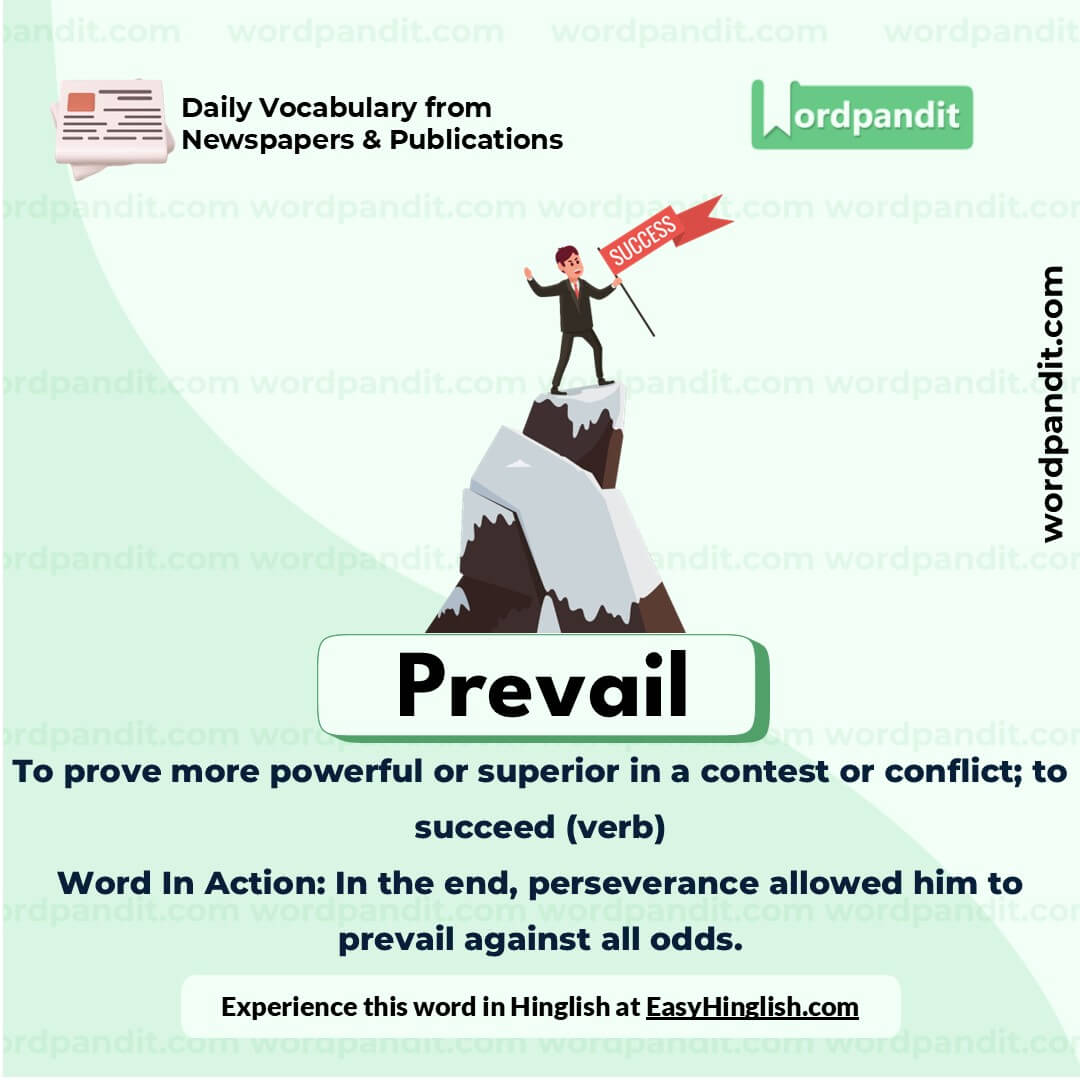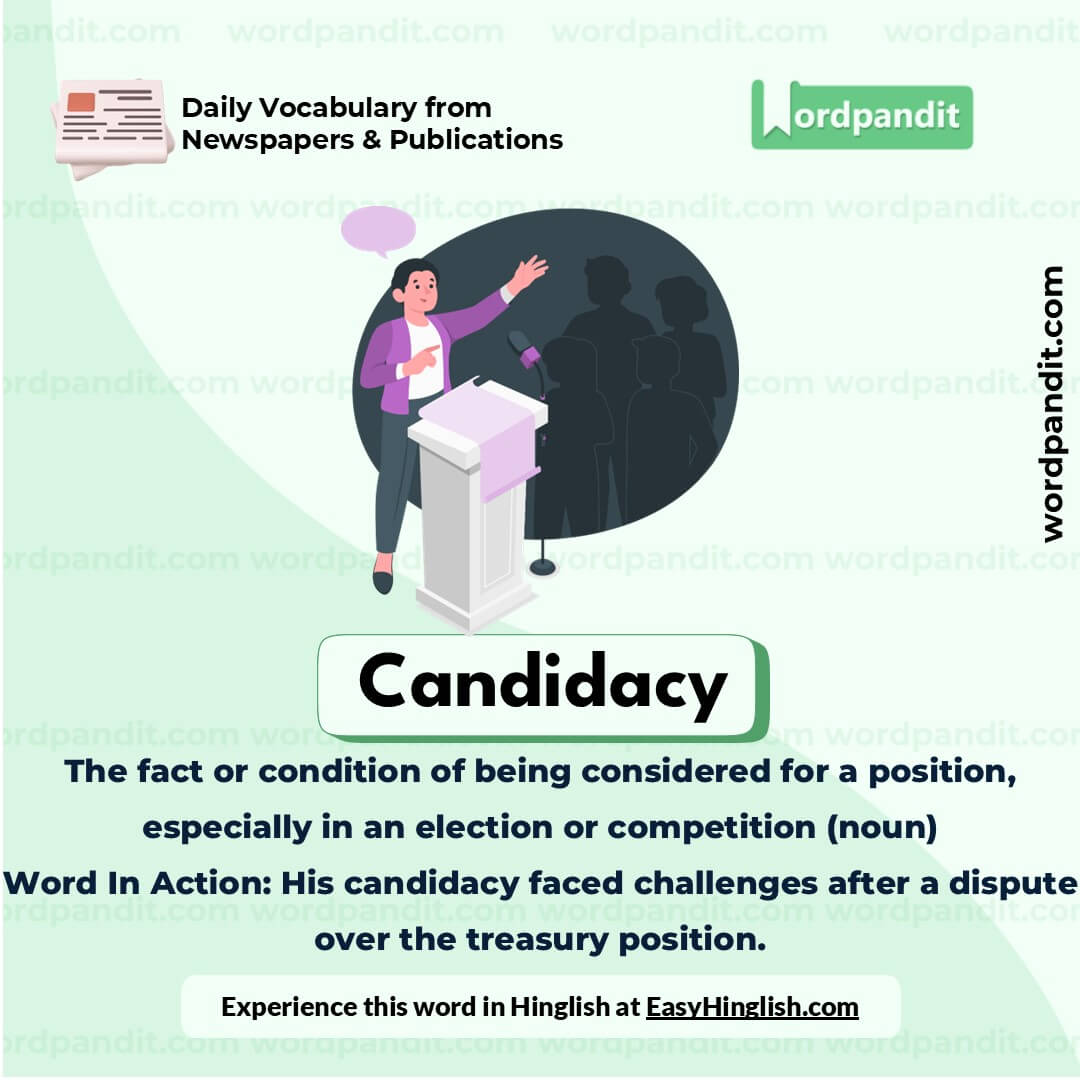Daily Vocabulary from International Newspapers and Publications
Expand Your Vocabulary with Wordpandit’s Global Vocabulary Hub
At Wordpandit, we are committed to helping you develop a truly global vocabulary by drawing from some of the most respected international publications. This section is designed to keep you ahead of the curve by introducing you to words that define global conversations and trends.
The Power of Global Sources
To help you think and communicate on a global scale, we curate vocabulary from renowned international sources, such as:
- The New York Times
- The Washington Post
- BBC
- The Guardian
- The Economist
- Scientific American
- Psychology Today
- And many more...
Stay Global, Stay Competitive
Our daily updates from international publications ensure you are consistently exposed to new words that reflect global news and developments, making sure your vocabulary is not only current but also globally relevant.
Enhance Your Global Perspective
Whether you’re preparing for international exams, aiming to excel in global business communication, or want to enhance your language skills for personal growth, Wordpandit offers the resources you need to thrive in a global context.
Effective Learning, Global Reach
Our learning methodology combines global examples, memory aids, and interactive activities, allowing you to internalize new words effectively and apply them in real-world scenarios.
Begin Your Global Vocabulary Journey Now!
Why Choose Wordpandit?
Practical Learning: Focus on words you'll actually encounter in real-world reading, enhancing your comprehension and communication skills.
Diverse Content: From current affairs to scientific breakthroughs, our varied sources expose you to vocabulary across multiple domains.
Effortless Integration: Make Wordpandit a part of your daily routine. Just a few minutes each day can significantly boost your lexicon over time.
Your Path to Vocabulary Mastery
- Visit our Daily Vocabulary section regularly
- Explore new words and their usage in context
- Practice incorporating these words into your own writing and speech
- Track your progress as your vocabulary expands
Start Your Journey Today
Embark on your vocabulary enhancement journey with Wordpandit. By consistently engaging with our daily posts, you'll build a robust vocabulary that serves you well in academic, professional, and personal contexts.
Remember, a word a day keeps linguistic limitations at bay. Make Wordpandit your daily companion in the quest for vocabulary excellence!
WORD-1: Prevail
Context:
" Mutual respect prevails among students and teachers here." - The Washington Post
Explanatory Paragraph:
The word "prevailed" means to succeed or triumph, often after a struggle or competition. In the given context, it highlights Bessent’s ability to overcome challenges and emerge victorious in securing a significant position as a trusted adviser, thanks to his allies' support and lobbying efforts.
Meaning: To prove more powerful or superior in a contest or conflict; to succeed (verb).
Pronunciation: preh-VAYL
Difficulty Level: ⭐⭐ Beginner
Etymology: From the Latin "praevalere," meaning "to be stronger," formed by "prae" (before) and "valere" (to be strong or have power).
Synonyms & Antonyms:
Synonyms: Triumphed, succeeded, overcame, won
Antonyms: Failed, lost, succumbed, surrendered
Usage Examples:
- Despite the challenges, the team prevailed and won the championship.
- In the courtroom, justice prevailed, and the innocent man was acquitted.
- The values of equality and freedom must prevail over prejudice and hatred.
- After a heated debate, her argument prevailed, convincing everyone of her perspective.
Cultural Reference:
The phrase "truth will prevail" is a popular saying, reflecting the belief that honesty and justice ultimately win over deceit and wrongdoing, often used in literature and political discourse.
Think About It:
Why do you think prevailing in a challenge often requires not only skill but also the support of others?
Quick Activity:
Write about a time when you or someone you know prevailed in a tough situation. What factors contributed to the success?
Memory Tip:
Link "prevailed" to "prevail" and think of it as "prevailing winds" that overpower and guide the direction, symbolizing strength and dominance.
Real-World Application:
The term "prevailed" is widely used in contexts such as sports, legal cases, and leadership to describe triumph against adversity, emphasizing persistence and determination.
WORD-2: Obscure
Context:
"NYTimes includes more obscure words to catch players out, double letters seem to cause many issues for players with half of this list containing double or triple-letter words." - The Telegraph
Explanatory Paragraph:
The word "obscure" means not well-known, difficult to understand, or hidden from general knowledge. In the context, it refers to the NYTimes using lesser-known words in games to challenge players, making it harder for them to succeed.
Meaning: Not clearly understood or easily distinguished; not well-known (adjective).
Pronunciation: uhb-SKYOOR
Difficulty Level: ⭐⭐⭐ Intermediate
Etymology: From Latin "obscurus," meaning "dark" or "covered," derived from "ob-" (over) and "scurus" (covered).
Synonyms & Antonyms:
Synonyms: Unclear, vague, hidden, cryptic
Antonyms: Clear, obvious, well-known, prominent
Usage Examples:
- The professor's lecture included many obscure references that confused the students.
- She enjoys reading novels by obscure authors who are not widely recognized.
- The meaning of the ancient text remains obscure despite extensive research.
- The village is so obscure that it isn’t even marked on most maps.
Cultural Reference:
The phrase "hidden in obscurity" is often used in literature to describe people or ideas that are overlooked or forgotten by society.
Think About It:
Why do you think obscure ideas or works often gain more attention and appreciation over time?
Quick Activity:
Identify an obscure word or phrase you recently encountered. Research its meaning and try using it in a sentence.
Memory Tip:
Think of "obscure" as something "covered or hidden" from view, making it hard to see or understand clearly.
Real-World Application:
The word "obscure" is often used to describe complex ideas, hidden truths, or lesser-known facts, making it a common term in academic, literary, and intellectual discussions.
WORD-3: Fortify
Context:
"He will help me usher in a new Golden Age for the United States, as we fortify our position as the World’s leading Economy.” - The Washington Post
Explanatory Paragraph:
The word "fortify" means to strengthen or reinforce something, whether it’s a physical structure, a position, or an idea. In this context, it refers to reinforcing the United States' status as a dominant economic power through strategic actions and policies.
Meaning: To strengthen or secure something to make it more robust or resilient (verb).
Pronunciation: FOR-tuh-fy
Difficulty Level: ⭐⭐ Beginner
Etymology: From the Latin "fortificare," meaning "to strengthen," derived from "fortis" (strong) and "facere" (to make).
Synonyms & Antonyms:
Synonyms: Strengthen, reinforce, secure, bolster
Antonyms: Weaken, undermine, dilute, impair
Usage Examples:
- The military is working to fortify its defenses along the border.
- She took steps to fortify her argument with solid evidence.
- The cereal is fortified with vitamins and minerals to improve its nutritional value.
- They decided to fortify their relationship by communicating openly and honestly.
Cultural Reference:
The term "fortify" is historically associated with medieval castles and fortresses, which were built to withstand attacks and protect inhabitants during sieges.
Think About It:
In what areas of your life could you use the concept of "fortify" to build greater strength or resilience?
Quick Activity:
List three ways in which a country can fortify its economy, using examples from history or current events.
Memory Tip:
Think of "fortify" as "fort" + "ify"—just like a fort strengthens a town, fortifying strengthens any situation or position.
Real-World Application:
"Fortify" is commonly used in contexts ranging from national security and health (fortified foods) to personal growth, symbolizing strengthening and preparing for challenges.
WORD-4: Deliberation
Context:
"The announcement followed an unusually contentious deliberation process, with multiple aides and Wall Street executives jockeying in a battle that spilled out into public view from Trump’s compound in Mar-a-Lago." - The Washington Post
Explanatory Paragraph:
The word "deliberation" refers to careful thought or discussion conducted with the aim of making a decision. In the context, it describes an intense and prolonged decision-making process marked by conflict and competition among involved parties.
Meaning: Long and careful consideration or discussion before making a decision (noun).
Pronunciation: dih-lib-er-AY-shun
Difficulty Level: ⭐⭐⭐ Intermediate
Etymology: From the Latin "deliberatio," meaning "weighing carefully," derived from "deliberare," meaning "to weigh" or "to consider."
Synonyms & Antonyms:
Synonyms: Consideration, discussion, contemplation, debate
Antonyms: Impulsiveness, rashness, haste, spontaneity
Usage Examples:
- After much deliberation, the jury reached a unanimous verdict.
- The board engaged in hours of deliberation before approving the new budget.
- The success of any plan requires thorough deliberation and careful execution.
- Her deliberate tone during the meeting suggested a well-thought-out strategy.
Cultural Reference:
The concept of "deliberation" is central to democratic systems, where laws and policies are made after careful discussion and debate, as seen in parliaments and congresses worldwide.
Think About It:
Why do you think deliberation is often seen as a strength in decision-making, and when might it become a hindrance?
Quick Activity:
Write about a time when you had to engage in deliberation before making an important decision. What factors influenced your choice?
Memory Tip:
Associate "deliberation" with a "library"—a place for careful thought and study, reflecting the idea of taking time to weigh options.
Real-World Application:
"Deliberation" is frequently used in governance, business, and personal decision-making to emphasize the importance of careful thought, collaboration, and analysis in reaching sound conclusions.
WORD-5: Candidacy
Context:
"But his candidacy took an unusual turn last week, when a dispute emerged over the treasury position." - The Washington Post
Explanatory Paragraph:
The word "candidacy" refers to the state of being a candidate, typically for a political office, position, or other role requiring selection. In the given context, it describes a person's pursuit of a treasury position and the unexpected challenges that arose during the process.
Meaning: The fact or condition of being considered for a position, especially in an election or competition (noun).
Pronunciation: KAN-dih-dah-see
Difficulty Level: ⭐⭐ Beginner
Etymology: From the Latin "candidatus," meaning "clothed in white," referring to Roman political candidates who wore white togas.
Synonyms & Antonyms:
Synonyms: Nomination, application, election bid, competition
Antonyms: Disqualification, withdrawal, rejection, ineligibility
Usage Examples:
- Her candidacy for the mayor's office was announced with great enthusiasm by her supporters.
- The party endorsed his candidacy after a rigorous selection process.
- His candidacy was challenged due to allegations of past misconduct.
- The company evaluated her candidacy for the CEO position with utmost care.
Cultural Reference:
In the United States, candidacy for political office often involves extensive campaigning, debates, and fundraising, reflecting the competitive nature of elections.
Think About It:
What qualities do you think are essential for someone to have a successful candidacy for a leadership role?
Quick Activity:
List three professions or roles where the process of candidacy is particularly competitive. What makes these roles challenging to secure?
Memory Tip:
Think of "candidacy" as related to "candidate," where both words signify someone officially presenting themselves for selection or election.
Real-World Application:
"Candidacy" is often used in discussions about elections, job applications, or competitive roles where individuals must meet specific criteria to be considered for the position.


















